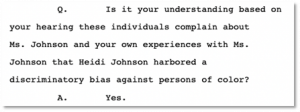Employment Law Firm PC represents Weldon Moore, an African American truck driver who worked at EXCEL USA in Baton Rouge, Louisiana. As alleged in the Amended Complaint the Superintendent of EXCEL’s operations at Louisiana Pigment plant in Lake Charles racially harassed Mr. Moore, often calling him and other African American employees “Black motherf*****”, telling Mr. Moore that he wished he could call his African American coworker the “N” word, and repeating a disgusting “joke”: “Mo, if a Black man and a Mexican man fell off a high-rise building, who do you think would hit the ground first?” When Mr. Moore (known as “Mo”), replied out of shock, “I don’t know, boss,” the Superintendent laughed and said, “Who gives a f***?”
As alleged in the Amended Complaint Mr. Moore complained first to Human Resources, in the presence of the EXCEL Louisiana Pigment plant project manager. The Human Resources representative said that she would keep his complaint on file. But neither Human Resources nor the EXCEL project manager engaged in any follow-up inquiries. The racial harassment not only continued, but Mr. Moore’s complaint to HR also resulted in retaliation from the Superintendent. He cut Moore’s days. When Mr. Moore spoke up about these changes to his boss, his boss simply replied, “You Black motherf*****, if you don’t like it, then drag the f*** up,” which Mr. Moore understood to mean “quit.”
In his next complaint Human Resources forced Mr. Moore to explain the racial harassment in the presence of his harasser, the Superintendent. The Superintendent stood up and screamed at Mr. Moore, “you mother*****” and stormed out of the meeting. Incredibly, he kept his job. When Mr. Moore returned to his work station, a member of management pulled up in his truck, handed him his business card, stating, “I don’t ever want you to let him or anyone else talk to you that way. If he does that again, call me.”
 Sexual Harassment Lawyer Blawg
Sexual Harassment Lawyer Blawg



